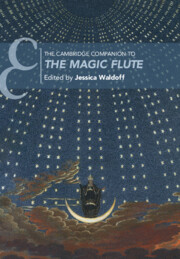Book contents
- The Cambridge Companion to The Magic Flute
- Cambridge Companions to Music
- The Cambridge Companion to The Magic Flute
- Copyright page
- Dedication
- Contents
- Figures
- Tables
- Musical Examples
- Contributors
- Acknowledgments
- Abbreviations
- Introduction
- Part I Conception and Context
- 1 German Opera in Mozart’s Vienna
- 2 The Magic Flute’s Libretto and German Enlightenment Theater Reform
- 3 Emanuel Schikaneder and the Theater auf der Wieden
- 4 The Magic Flute in 1791
- Part II Music, Text, and Action
- Part III Approaches and Perspectives
- Part IV Reception, Interpretation, and Influence
- Further Reading
- Index
1 - German Opera in Mozart’s Vienna
from Part I - Conception and Context
Published online by Cambridge University Press: 24 November 2023
- The Cambridge Companion to The Magic Flute
- Cambridge Companions to Music
- The Cambridge Companion to The Magic Flute
- Copyright page
- Dedication
- Contents
- Figures
- Tables
- Musical Examples
- Contributors
- Acknowledgments
- Abbreviations
- Introduction
- Part I Conception and Context
- 1 German Opera in Mozart’s Vienna
- 2 The Magic Flute’s Libretto and German Enlightenment Theater Reform
- 3 Emanuel Schikaneder and the Theater auf der Wieden
- 4 The Magic Flute in 1791
- Part II Music, Text, and Action
- Part III Approaches and Perspectives
- Part IV Reception, Interpretation, and Influence
- Further Reading
- Index
Summary
This chapter provides an overview of the history, habits, and musico-dramatic conventions of German comic opera in German courtly theaters, the Burgtheater and Kärtnertortheater, and the three suburban theaters: the Theater in der Leopoldstadt, Theater auf der Wieden, and the Theater in der Josephstadt. Arguing for a transnational development of German opera, it delves deeply into paradigmatic examples of key moments in courtly and suburban theatrical life: Ignaz Umlauf’s Die Bergknappen (1778) and its relationship to resource extraction and mining in late eighteenth-century Vienna; Wranitzky’s Oberon (1789) and elements of magic opera in dialogue and in song; and finally, comic antics in Wenzel Müller’s Kaspar der Fagottist (1791).
Keywords
- Type
- Chapter
- Information
- The Cambridge Companion to The Magic Flute , pp. 9 - 29Publisher: Cambridge University PressPrint publication year: 2023

